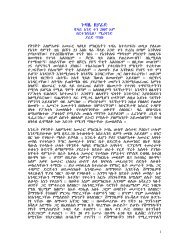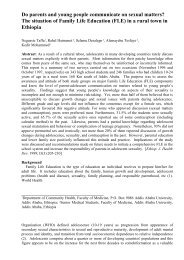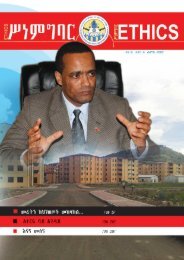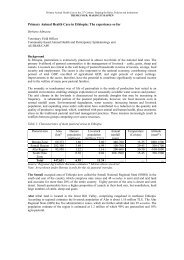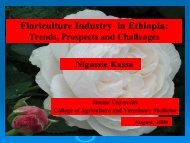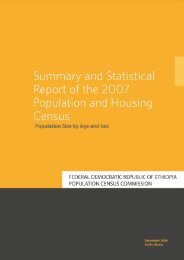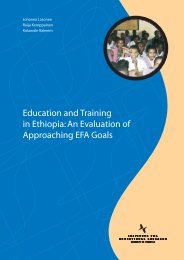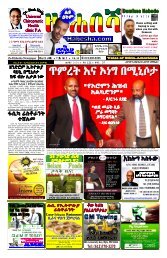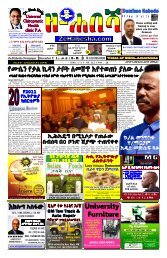Figure 3: The network of a migrant from the southTradeCash/materialInfoMMigrantAssoc'nMarriageSocialTransfers of <strong>in</strong>formation <strong>and</strong> cash/material resourcesLong <strong>and</strong> short-term migrants are <strong>in</strong>strumental <strong>in</strong> provid<strong>in</strong>g <strong>in</strong>formation about jobs,education <strong>and</strong> bus<strong>in</strong>ess opportunities to their children, <strong>and</strong> young unmarried women <strong>and</strong>men. The earlier migrants often attract relatives to jo<strong>in</strong> them <strong>and</strong> work with them forsometime.In both Kolfe <strong>and</strong> Shashemene sites, most of the male migrants from the south (Gamo,Gurage, Dorze, Kembata, Hadiya, Wolayita) revealed that they often transfer <strong>in</strong>formation<strong>and</strong> sometimes resources as gifts once a year dur<strong>in</strong>g Meskel or Arefa holidays. They oftensend cash, clothes, shoes, household utensils, farm implements, kerosene, shoes, soap,salt <strong>and</strong> other consumer goods to their close relatives <strong>in</strong> rural areas <strong>in</strong> order to assistthem, <strong>and</strong> help them cope with f<strong>in</strong>ancial difficulties <strong>and</strong> crises. However, many of thefemale married respondents stated that they are f<strong>in</strong>ancial constra<strong>in</strong>ed <strong>and</strong> sometimes f<strong>in</strong>dit hard to fulfil these expectations s<strong>in</strong>ce they do not have control over the family <strong>in</strong>come.Thus it seems easier for male migrants <strong>and</strong> unmarried female migrants to meet suchholiday obligations..The transfer of material resources is sometimes reciprocal. For <strong>in</strong>stance, Wolayitamigrants <strong>in</strong> Shashemene take clothes, salt, sugar, spices <strong>and</strong> onions when they go back totheir home areas. The migrants return with butter, cheese, potato, bula (a flour made from48
false banana) <strong>and</strong> maize. Similarly, Kembata migrants take millet, pepper, oil <strong>and</strong> barleywhen they visit their families <strong>and</strong> relatives <strong>in</strong> Kembata. In return, they br<strong>in</strong>g banana,baskets, bula, butter <strong>and</strong> bamboo mats from their rural homes.MarriageMarriage is one of the mechanisms that l<strong>in</strong>k urban <strong>and</strong> rural areas. This is especially true<strong>in</strong> the case of long-term <strong>in</strong>habitants who came to Kolfe <strong>and</strong> Shashemene on a permanentbasis <strong>in</strong> search of a better life <strong>in</strong> town. Most of the migrants from Kembata, Hadiya,Gamo <strong>and</strong> Gurage prefer to marry with<strong>in</strong> their ethnic groups. Hence, long-term malemigrants from these groups br<strong>in</strong>g their spouses from their home areas. There are timeswhere a long-term migrant, notably from Gurage (both Muslim <strong>and</strong> Orthodox Christians),can have two wives <strong>and</strong> ma<strong>in</strong>ta<strong>in</strong> two households, one <strong>in</strong> the rural <strong>and</strong> the other <strong>in</strong> urbanareas. Accord<strong>in</strong>g to some respondents, a migrant from Gurage culture usually marries awife at home to keep his l<strong>and</strong> <strong>and</strong> look after his property.Iddir <strong>and</strong> self-help groupsMost of the long-term migrants have established strong social networks. Ethnic-basediddir (burial associations) are very strong <strong>and</strong> br<strong>in</strong>g migrants together <strong>in</strong> times of need<strong>and</strong> mutual assistance. For <strong>in</strong>stance, <strong>in</strong> Serategna Sefer <strong>in</strong> Shashemene, the long-termresidents of the sefer have formed Sodo Iddir <strong>and</strong> Sebat-bet Iddir for migrantsspecifically from the Gurage areas, <strong>and</strong> they help each other <strong>in</strong> both good <strong>and</strong> bad times.The cash contributions they make differ from one group to another. Similarly, long-termfemale <strong>and</strong> male migrants from Wolayita <strong>and</strong> Kembata liv<strong>in</strong>g <strong>in</strong> Bishate Sefer,Shashemene, have also formed self-help associations to organise jo<strong>in</strong>t trips to celebrateMeskel with their relatives <strong>in</strong> rural areas. If a relative liv<strong>in</strong>g <strong>in</strong> a rural area facesdifficulties a migrant liv<strong>in</strong>g <strong>in</strong> Shashemene or Kolfe is supposed to visit or send cash tosolve the problem back at home. In case such family support is beyond the capacity of amigrant, the association members might contribute cash <strong>and</strong> assist the migrant to helphis/her k<strong>in</strong> <strong>in</strong> the rural areas.The Gamo <strong>and</strong> Gurage migrants <strong>in</strong> Kolfe also have similar sub-ethnic-based self-helpassociations <strong>and</strong> iddir <strong>and</strong> they help each other dur<strong>in</strong>g crises <strong>and</strong> happy times likewedd<strong>in</strong>gs. The iddir contributions can range from 5-10 birr per month. If a migrant dies,friends <strong>and</strong> associates from the same place of orig<strong>in</strong> take the body of the deceased to beburied <strong>in</strong> their homel<strong>and</strong>. We also learnt that some migrants from Gamo <strong>and</strong> Guragecont<strong>in</strong>ue to ma<strong>in</strong>ta<strong>in</strong> their membership <strong>and</strong> make contributions to their rural iddir, even ifthey have left their home areas for a long period of time. They make arrangements withthe leadership of rural iddir or delegate their family members to contribute cash <strong>and</strong> noncashcontributions on their behalf. Similarly, the long-term migrants from Kembata <strong>and</strong>Wolayita, have formed ethnic-based associations. For <strong>in</strong>stance, the Kembata association,which is called ‘Kembata family association’, was established to support Kembata <strong>in</strong>times of crisis such as death <strong>and</strong> also other social happen<strong>in</strong>gs such as wedd<strong>in</strong>gs. Wolayita49
- Page 1 and 2:
Migration and Rural-Urban Linkages
- Page 3 and 4: ABSTRACTThe paper examines key issu
- Page 5 and 6: LIST OF TABLES, FIGURES AND MAPSTab
- Page 7 and 8: Executive SummaryThis study attempt
- Page 9 and 10: of development structure can serve
- Page 11 and 12: The paper examines key issues affec
- Page 13 and 14: functions. The improvement of physi
- Page 15 and 16: agriculture, de-prioritisation of u
- Page 17 and 18: The promulgation of ethnic-based fe
- Page 19 and 20: including development policies and
- Page 21 and 22: Proponents also argue that forms of
- Page 23 and 24: Figure 2: Positive Links between Mi
- Page 25 and 26: and voluntary associations as a mec
- Page 27 and 28: OSSREA (1995) presents the findings
- Page 29 and 30: elated to marriage, notably moving
- Page 31 and 32: Table 2: Reason for absenceFrequenc
- Page 33 and 34: as well as Tigray, the following as
- Page 35 and 36: Table 6: Location where household m
- Page 37 and 38: survey in May 2004. Most of these,
- Page 39 and 40: Table 9: Location where household m
- Page 41 and 42: Table 11: Reason for absenceFrequen
- Page 43 and 44: Dinki, Amhara: Out-migration trends
- Page 45 and 46: Table 13: Household members away fr
- Page 47 and 48: There are still considerable number
- Page 49 and 50: 2.2.Type of work and livelihoods of
- Page 51 and 52: Migrants work on different terms th
- Page 53: technology and lifestyles. Furtherm
- Page 57 and 58: sell the alcoholic drink, areke, wh
- Page 59 and 60: where there is a sugar plantation,
- Page 61 and 62: Table 23: Type of support received
- Page 63 and 64: 2.4. Preferences regarding urban ce
- Page 65 and 66: urban sites, Kolfe and Shashemene,
- Page 67 and 68: 2.6. Labour force and employment op
- Page 69 and 70: egion was high and was not impeded
- Page 71 and 72: LBox 2: List of migration experienc
- Page 73 and 74: Case 5: ES, male, poor, seasonal /s
- Page 75 and 76: Case 11: AD, female, Oromia migrant
- Page 77 and 78: alleviated by appropriate rural dev
- Page 79 and 80: Successive Ethiopian governments to
- Page 81 and 82: in providing information about jobs
- Page 83 and 84: this recommendation but its impleme
- Page 85 and 86: Carney, D., 1998, Sustainable Rural
- Page 87 and 88: Kloos, H. (1988). "Ethiopia's Econo
- Page 89 and 90: Annex 1: The WeD-Research SitesMap
- Page 91 and 92: Map 4:Sketch map of Imdibir85
- Page 93 and 94: Map 6:Sketch map of Shashemene87
- Page 95 and 96: Map 8:Sketch map of Korodegaga89
- Page 97: Table 33: National Rural Migrants P


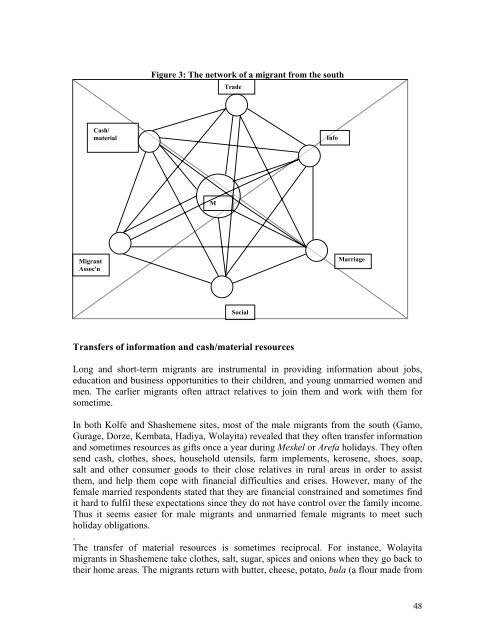

![to read the full report [pdf, Amharic] - Ethiopian Review](https://img.yumpu.com/52737829/1/190x245/to-read-the-full-report-pdf-amharic-ethiopian-review.jpg?quality=85)
